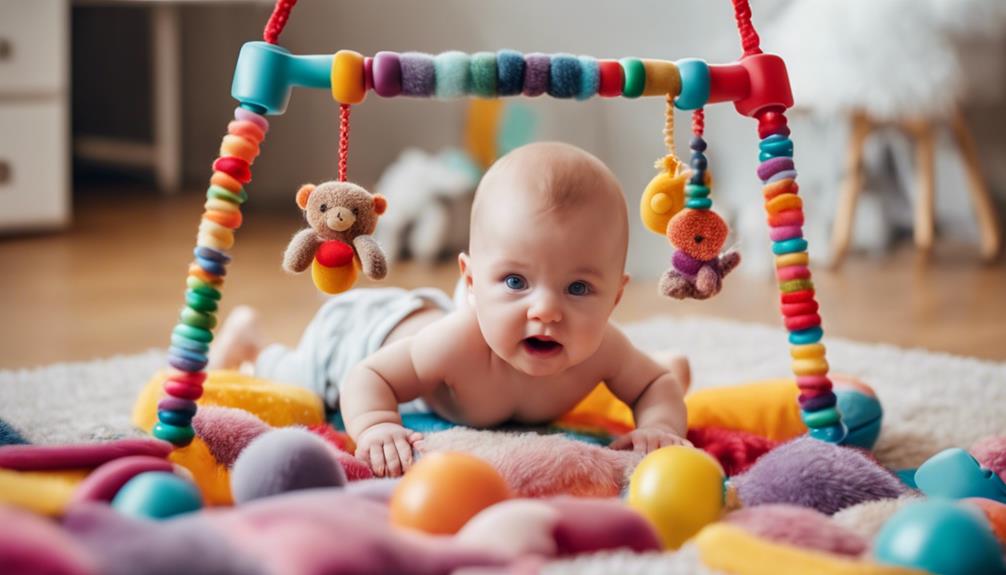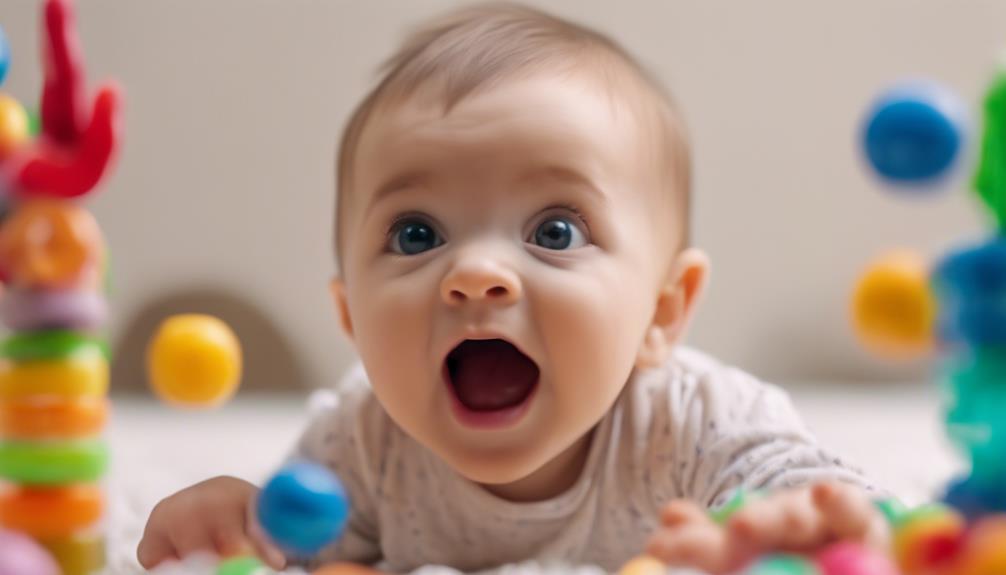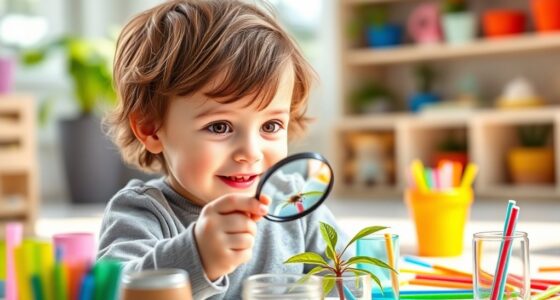At 2 months old, your baby is developing quickly. They are beginning to track moving objects with their eyes and may respond to sounds by turning their head. Recognizing familiar faces and voices is an important milestone, which supports their cognitive development. Encourage their sensory exploration with colorful toys and interact with them using your voice. Providing cognitive stimulation through music and reading can help nurture their early development. Keep reading to discover how these milestones contribute to your baby’s future growth and learning.
Key Takeaways
- Responds to vocal stimuli with cooing sounds.
- Shows auditory awareness by turning towards sounds.
- Engages with colorful toys for visual stimulation.
- Begins to babble to communicate needs.
- Develops eye tracking skills for early reading engagement.
Visual Tracking Abilities
By two months old, your baby should be actively tracking moving objects with their eyes, displaying improved visual tracking abilities. This is an important developmental milestone as it shows that your baby is beginning to develop hand-eye coordination and depth perception.
You may notice your baby following your face or a toy as you move it from side to side, indicating their growing visual tracking skills. Engaging in activities that involve tracking objects can further support your baby's visual development at this stage.
It is vital to encourage and nurture these visual tracking abilities in your baby. If you have any concerns about your baby's visual tracking skills, it's recommended to consult with a pediatrician or eye specialist for further evaluation. These professionals can provide guidance on how to best support your baby's visual development and address any potential issues that may arise.
Sensory Integration
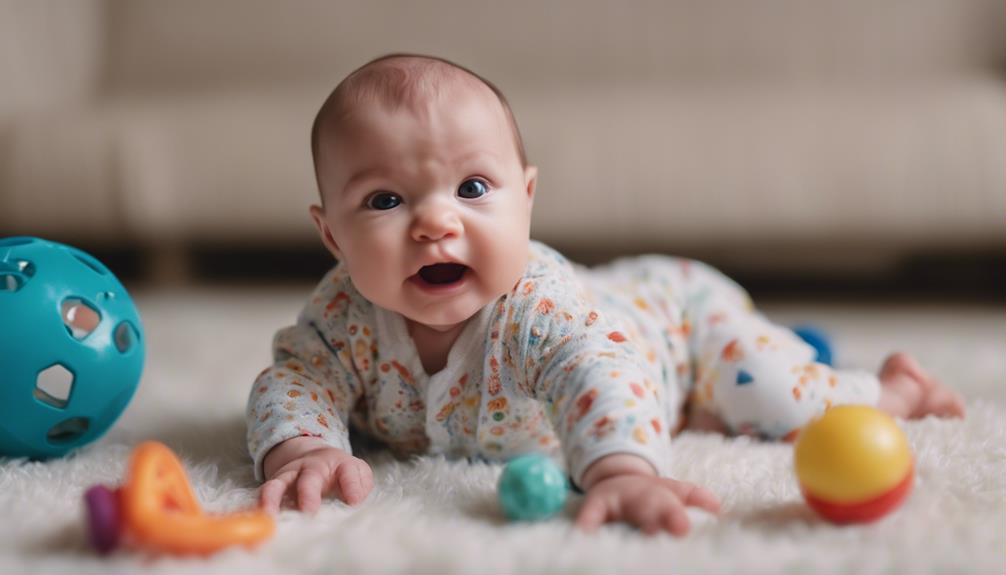
At 2 months old, your baby is starting to integrate sensory information, like following moving objects with their eyes and reacting to sounds in their surroundings. This sensory development helps them recognize familiar faces, objects, and voices, setting the stage for future cognitive growth.
Engaging your baby with toys that make sounds or have bright colors can support their sensory integration and overall development.
Sensory Responses Development
During this stage, your 2-month-old baby is actively developing their sensory responses and starting to integrate information from their senses.
At 2 months old, babies are becoming more aware of stimuli like touch, sound, and sight. You may notice your baby turning their head towards sounds, following moving objects with their eyes, or reaching out to touch things around them.
This sensory integration process is vital as it helps babies make sense of their surroundings, laying the groundwork for future cognitive development and learning.
By engaging your baby's senses through activities like talking, singing, and providing different textures to explore, you can enhance their sensory responses and overall development.
By observing how your baby responds to sensory input, you can gain valuable insights into their cognitive and neurological progress.
Encouraging sensory exploration in these early months can have lasting benefits for your baby's growth and understanding of the world.
Visual Tracking Progress
As your 2-month-old baby progresses in sensory development, their visual tracking skills are becoming more significant, allowing them to follow moving objects with their eyes.
At this stage, infants are alert to sound and can turn their heads toward noises, showcasing early sensory integration abilities. Visual tracking progress involves the integration of new sensations and stimuli in their environment, contributing to their cognitive development.
You can support your baby's visual tracking progress by engaging in activities that involve moving objects or creating sounds to prompt their response. Tracking objects with their eyes is an essential cognitive milestone for a 2-month-old, aiding in their overall development.
Encouraging your baby to follow objects visually not only enhances their sensory integration but also strengthens their ability to focus and engage with their surroundings. Keep nurturing their visual tracking skills to promote healthy cognitive growth and development.
Auditory Awareness
At 2 months old, your baby is starting to show auditory awareness by turning towards sounds and voices in their surroundings. They might react to loud noises by becoming more alert or startled, indicating sensitivity to auditory stimuli.
Recognizing familiar voices, like those of caregivers, is a sign of early sound recognition in your little one.
Sound Localization Skills
By 2 months old, your baby is starting to exhibit early auditory awareness through turning their head towards the source of sounds, showcasing developing sound localization skills. This means that your baby can track the direction of a sound, showing an understanding of sound location.
You may notice your baby responding differently to sounds coming from various directions, which indicates their growing ability to locate and differentiate between sounds. This auditory awareness is essential as it helps babies begin to distinguish between different sounds in their environment.
The development of sound localization skills at 2 months lays the groundwork for later language and communication development. Encouraging your baby's auditory awareness by providing a variety of sounds and verbal interactions can further support their emerging sound localization abilities.
Remember to create a nurturing environment that stimulates your baby's auditory senses to aid in their overall cognitive growth.
Response to Voices
Your 2-month-old baby will actively respond to voices by turning their head towards sounds and seeking out their source. This response to voices showcases their growing auditory awareness, as they become more alert to different sounds in their environment.
At this age, your baby may startle or become quiet when exposed to loud noises, indicating their sensitivity to auditory stimuli. By responding to voices, babies begin to distinguish between familiar voices and other sounds, laying the foundation for language acquisition and communication skills.
This ability to recognize and respond to voices is an important milestone in your baby's intellectual development, setting the stage for further language development and social interactions.
Encourage this response by talking to your baby frequently, singing lullabies, and engaging in interactive conversations to foster their growing auditory awareness and strengthen the bond between you and your little one.
Familiar Voice Recognition

How early can a 2-month-old baby begin recognizing and responding to familiar voices?
At 2 months of age, your baby is already showing signs of familiarity with the voices of their loved ones. Here are some key points to keep in mind regarding your baby's recognition of familiar voices:
- Distinguishing Familiar Voices: Research indicates that babies as young as 2 months old can differentiate between voices they know, like those of their primary caregivers, and unfamiliar voices.
- Soothing Effect: Hearing a familiar voice can have a calming effect on your baby, providing them with a sense of security and comfort.
- Emotional Response: Babies may display excitement or a sense of calmness when they hear a familiar voice, demonstrating their emotional connection and cognitive recognition.
- Social Development: Recognizing familiar voices at this age is important for building social and emotional bonds, as it helps in forming attachments and relationships with caregivers.
Understanding how your baby responds to familiar voices can deepen the emotional connection between you and your little one.
Interest in Faces

Babies at 2 months old typically show an increased fascination with faces, displaying a growing interest in recognizing familiar faces and responding to various facial expressions. They may begin focusing on specific facial features like eyes and mouths, tracking movements more consistently. This interest in faces marks an important emotional milestone in their development, as recognizing and responding to different facial expressions helps babies build emotional intelligence and social skills early on.
To emphasize the significance of babies' interest in faces, consider the following table:
| Significance of Interest in Faces |
|---|
| Helps in recognizing familiar faces |
| Facilitates emotional intelligence development |
| Encourages social bonding |
Encouraging face-to-face interaction with your baby can further stimulate their interest in faces, fostering emotional growth and strengthening the parent-child bond. By responding to your baby's expressions and engaging in interactive facial gestures, you are actively supporting their emotional milestones.
Social Smiling
Around 6-8 weeks of age, infants typically begin displaying social smiling as a key indicator of their developing social awareness and ability to connect with others. Social smiling is a significant milestone in your baby's growth and interaction with the world.
Here are some key points about social smiling:
- Emergence: Social smiling usually emerges between 6-8 weeks in infants, marking the beginning of their ability to respond socially.
- Deliberate Response: Unlike reflexive smiles, social smiling is a purposeful response to social stimuli like faces, voices, or interactions.
- Connection: Babies may start smiling in response to familiar faces or voices, showing their growing ability to connect emotionally with others.
- Emotional Expression: This milestone highlights your baby's expanding social awareness and capacity to express positive emotions through smiling.
Watching your baby engage in social smiling isn't only heartwarming but also an essential step in their social and emotional development.
Vocal Interaction
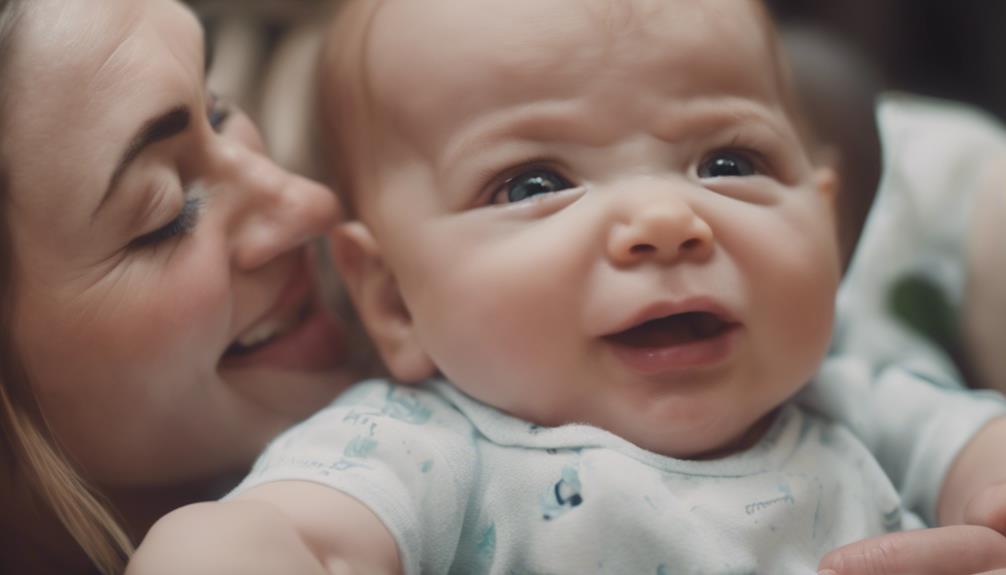
As your 2-month-old baby starts to make cooing sounds in response to vocal interactions, they are laying the foundation for language development through engaging in early communication exchanges. Vocal interactions, such as talking, reading, and singing, play an important role in fostering your baby's language skills. Responding positively to your baby's vocalizations can encourage further communication and strengthen the bond between you. Your baby may cry or babble to communicate their needs, showing their growing ability to engage in vocal exchanges.
| Vocal Interaction Milestones at 2 Months | Description |
|---|---|
| Cooing sounds in response to voices | Baby starts to respond to vocal stimuli |
| Turning head towards sounds | Increased attentiveness to voices |
| Babbling to communicate needs | Beginning of using vocalizations for needs |
| Engaging in early vocal exchanges | Building the foundation for language development |
These interactions are essential for your baby's cognitive development and will help them become more communicative as they grow.
Cognitive Stimulation
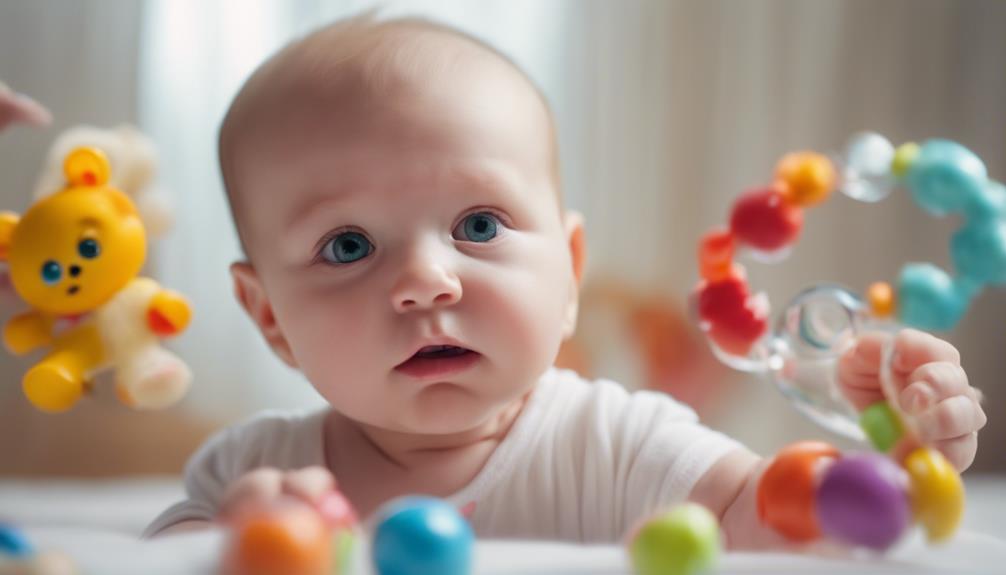
To stimulate cognitive development in your 2-month-old baby, engage in activities that involve tracking moving objects. This helps enhance visual development and cognitive processing.
Additionally, talking to your baby frequently is essential for promoting language acquisition and cognitive growth.
Introduce colorful toys and objects to encourage visual stimulation, aiding in cognitive milestones.
Providing opportunities for sensory exploration through different textures and materials can also contribute to cognitive development.
Moreover, using music and rhythmic sounds can engage your baby's auditory senses, further promoting cognitive processing.
Reading Engagement
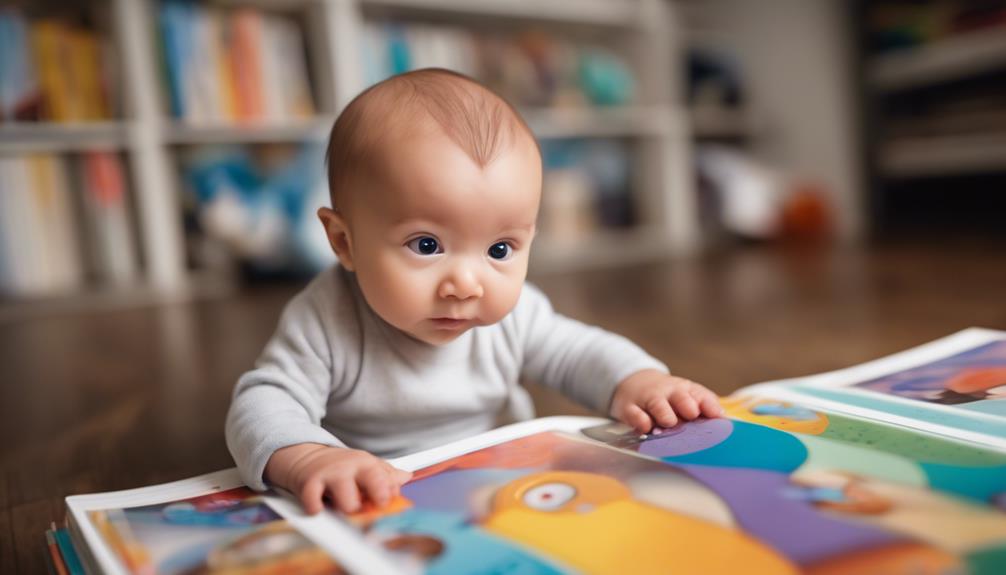
At 2 months, your baby's eye tracking skills and visual attention span are developing rapidly.
Introducing high-contrast board books can help stimulate their visual development.
Pointing out objects in the book and reading aloud can lay the foundation for a love of books in the future.
Eye Tracking Skills
By 2 months old, your baby's eye tracking skills are rapidly developing, allowing them to follow moving objects with increased precision. This development is essential for their future reading engagement as it helps them focus on and track words on a page.
Here are some key points to keep in mind:
- Improved Visual Tracking: Babies at this age can easily shift their gaze from one object to another, showcasing advancements in their visual tracking abilities.
- Foundation for Reading: Strong eye tracking skills at 2 months lay the groundwork for later reading and cognitive development.
- Enhancing Coordination: Engaging in activities that involve tracking objects can further enhance your baby's eye coordination and focus.
- Future Skills: Developing these skills early on can set the stage for better reading comprehension and overall cognitive growth in the future.
Encouraging and nurturing your baby's eye tracking abilities from a young age can have long-lasting benefits on their intellectual development.
Visual Attention Span
Developing your 2-month-old baby's visual attention span is essential for fostering early reading engagement and cognitive development. At this age, your baby may have a visual attention span of about 1-2 minutes, showing interest in looking at pictures or objects.
They may start to focus on high-contrast patterns or colorful images, engaging with visual stimuli for short periods. It's common for babies to show a preference for faces or familiar objects, indicating early signs of visual recognition.
To encourage reading engagement, consider using simple board books with contrasting colors and large, clear images to capture your baby's attention. Engaging in interactive reading sessions with a caregiver can help develop your baby's visual attention span and foster a love for books and reading.
Toy Play
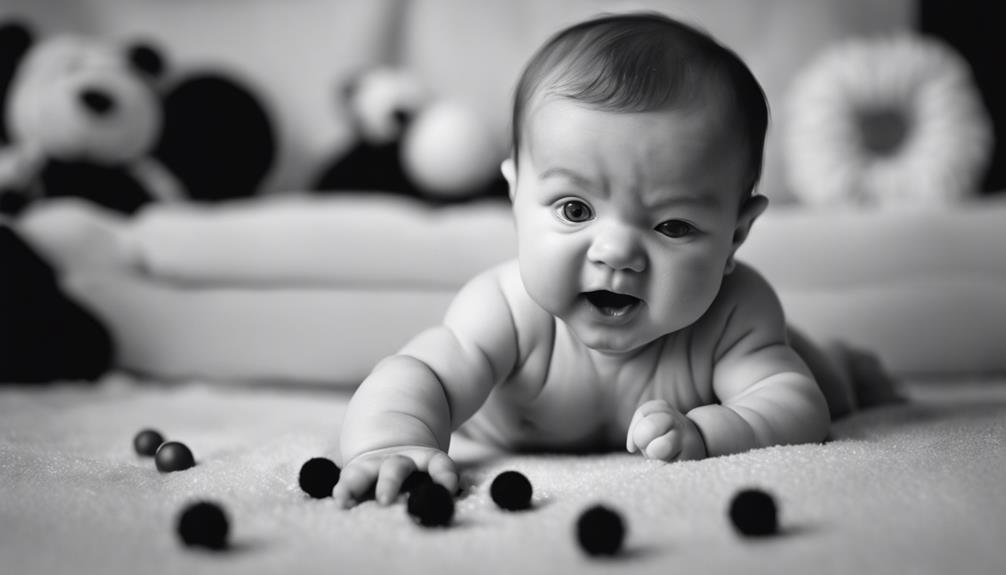
Engage your 2-month-old baby with simple, stimulating toys that encourage exploration and sensory development. Introducing toys at this age can help in fostering various developmental skills.
Here are some toy play milestones to look out for:
- Visual Engagement: Your baby may start showing interest in toys by gazing at them for a few seconds. Choose toys with bright colors or high-contrast patterns to capture their attention.
- Reaching and Grasping: At this stage, your baby might begin reaching for toys or trying to grasp them with their hands. Opt for lightweight toys that are easy to hold and manipulate.
- Textural Exploration: Simple toys with different textures can aid in stimulating your baby's tactile senses. Consider toys with soft fabrics or smooth surfaces for them to explore.
- Interactive Toys: Toys that produce sounds or have moving parts can intrigue your baby and encourage them to explore through touch and sound. Select toys that are safe and age-appropriate for interactive play sessions.
Frequently Asked Questions
What Is Intellectual Development in a 2 Month Old?
At 2 months, your baby's intellectual development involves recognizing faces, following moving objects, showing feelings through crying and smiling, responding to sounds, making cooing noises, and engaging in communication. Activities like talking, reading, and singing support their growth.
What Is Brain Development for 2 Months Old Baby?
At 2 months old, your baby's brain is focused on recognizing faces, tracking objects, and responding to sounds. Engage in activities like talking and singing to stimulate their development. They're starting to show interest in their surroundings.
What Motor Skill Development Is 2 Month Old?
So, what motor skills are you rocking at 2 months old? You're lifting that head during tummy time, moving those arms and legs smoother, following objects with your eyes like a champ. Keep it up!
What Are Intellectual Milestones Age 2?
You're exploring and learning about the world at age 2. Recognizing faces, responding to voices, and showing interest in objects are some milestones. Your increased alertness and interactions with caregivers help you develop intellectually.
Conclusion
By the age of 2 months, your baby is developing key intellectual skills that will shape their future growth.
For example, Jessica's 2-month-old son, James, showed a strong interest in faces and began to vocalize more during playtime.
These milestones are important indicators of your baby's cognitive development and can help guide you in providing the right stimulation and support for their learning journey.
Keep engaging with your little one and watch them flourish!



